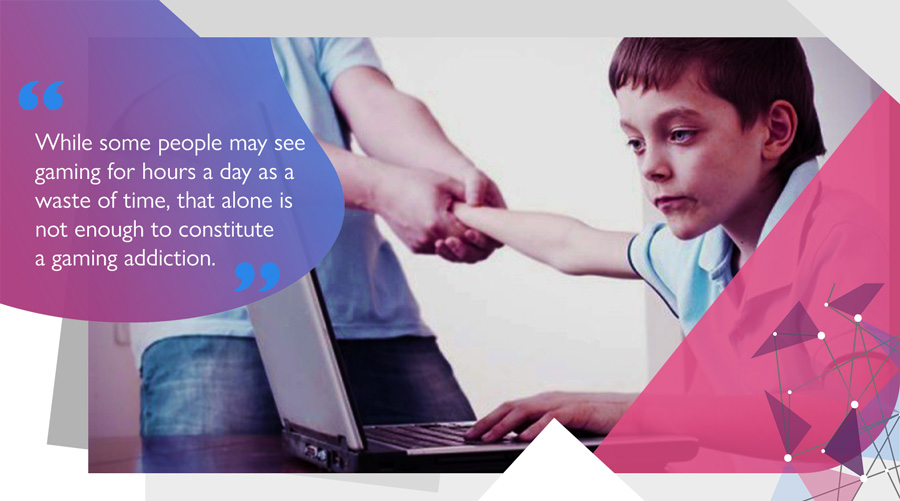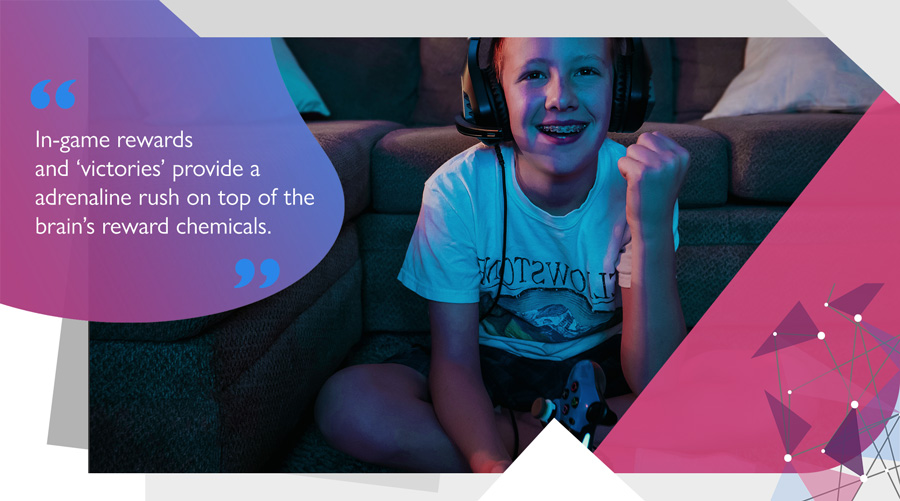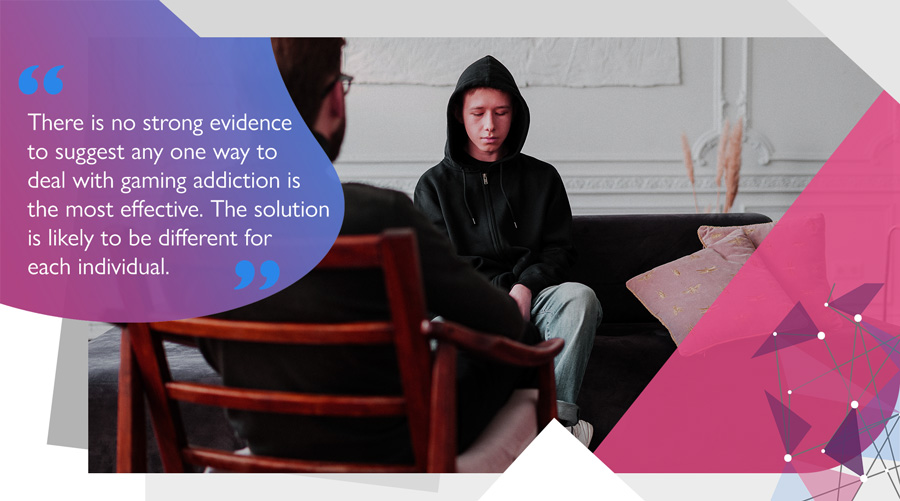What is gaming addiction?
The World Health Organisation (WHO) included Gaming Disorder in its International Classification of Diseases (ICD) in 2018. Despite this, there are still issues with gaming addiction not being accepted as a ‘legitimate’ addiction.
‘Addiction’ is often linked with substances and physical dependency. However, uncontrollable, compulsive behaviours will be present in someone addicted to gaming.

Signs of gaming addiction
The symptoms described by the WHO include:
- An inability to control gaming habits
- Prioritising gaming in daily life over other interests or activities, even if it means neglecting basic necessities such as personal hygiene and proper sleep
- Continuing to focus intently on gaming even when doing so has negative consequences in the real world
Withdrawal symptoms such as restlessness or depression when not gaming, relying on gaming as a ‘cure-all’ for negative emotions and lying about the time spent gaming are also common signs of gaming addiction.
Diagnosing a disorder
While some people may see gaming for hours each day as a waste of time, that alone is not enough to constitute a gaming addiction. It’s only when combined with the above symptoms that long gaming hours are classified as gaming disorder.
These behaviours usually need to have been present for at least a year to be formally diagnosed. However, the behaviour can be ‘episodic’, meaning it doesn’t need to happen every day.
How do people become addicted to online gaming?
Some gamers are more susceptible to gaming addiction than others. The same issues that trigger other addictions, such as stress or unhappiness in daily life, can lead people to use gaming as an unhealthy means of escape.
Some addiction specialists believe gaming can serve as an endless source for addiction-fuelling behaviours. Depending on the design, and intent behind the design, games can stimulate the brain’s ‘reward centre’ as tasks are completed. In-game rewards and ‘victories’ provide an adrenaline rush on top of the brain’s reward chemicals.
In non-linear games like Battle Royale Fortnite, there is no story to provide a natural end point. The rewards simply continue to stack, keeping the player hooked into a pleasurable cycle.

Addiction across different game genres
It’s possible to become addicted to any type of game: from offline single player activities like Solitaire to Massively Multiplayer Online Role-Playing Games (MMORPGs) like World of Warcraft or Runescape.
Single-player rush
Simple challenge games suited to a smartphone experience, like Solitaire, stimulate the reward centre of the brain, but also provide quick, easy entertainment. This has the potential to develop into a habit for a personality susceptible to addiction.
There are countless possible combinations of cards. Aside from ‘winning’ a game, there is no definitive ‘completion’ condition, as in a story-driven game. Instead, each win provides the potential to convert into an easy dopamine hit.
If the game is designed for a mobile platform, other mechanics like social-media driven leaderboards, can be built into the experience – fuelling a player’s competitive instincts.
Fear of missing out
In MMOs, time passes in the game world. It can feel like people and events are progressing in the player’s absence while offline. If a player’s guild or their friends are online completing raids and challenges without them, it’s not just in-game experience but a shared social experience that’s being missed.
The ever-evolving lore of these worlds also have no definitive ending. As with Solitaire, there’s no natural stopping point. As new milestones are reached, and fresh content and expansions launch, the player continues to have a reason to return.
To become a high-level MMO player takes a lot of time and effort. Resources must be earned or ‘mined’, quests completed, and situational skills and strategies developed. This ‘pursuit’ for progress can bloom into an addiction for some players; the feeling of working towards something important, plus the time invested, is a powerful draw.
What can be done to help online gaming addiction?
The solution is likely to be different for everyone. There is no strong evidence to suggest any one way to deal with gaming addiction is the most effective.
Cognitive Behavioural Therapy is a common approach. This involves developing healthier habits or patterns of behaviour that are to be repeated in stressful situations or daily life. Healthier coping strategies reduce the need to retreat into games.
Other behavioural adjustments
Reducing gaming time and recognising and understanding compulsive behaviours also helps to reduce gaming dependence. Many treatment programs suggest total abstinence for gaming addicts, believing any exposure to something addictive can reawaken unwanted behaviour.
Some players may find tackling issues in their outside lives allows them to enjoy gaming without becoming addicted. Some may find switching from ‘endless’ online games to finite linear narrative-style games allows them to better control their gaming time. Others may choose not to game at all.

Finding positive ways to cope
It should be stressed that intense or increased gaming time doesn’t necessarily indicate an addiction. It’s possible to engage passionately with a hobby without losing the ability to control when and how you choose to take part.
If you, or people close to you, are concerned that gaming may be impairing your ability to live well, try to review your behaviour objectively. Step back for a bit: time your gaming sessions and set yourself a reasonable schedule. Alternatively, try switching to other interests and activities for a while.
If you still feel like nothing is working, try seeking an intervention. Explain how you feel to someone you can trust, be it a family member, friend, or other individual in your community. You may also wish to consider the possibility of professional advice from a medical professional or specialist organisation.
For more information or advice about aspects of gaming life and culture, check out other posts in Ghost’s blog. As gamers ourselves, we take an interest in issues across the gaming spectrum, from online cyber bullying to the marketing of games towards female gamers.

